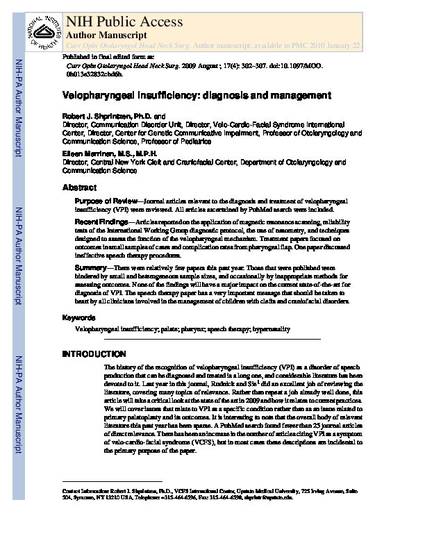
Article
Velopharyngeal Insufficiency: Diagnosis and Management
Current Opinion in Otolaryngology & Head & Neck Surgery
Document Type
Peer-Reviewed Article
Publication Date
8-1-2009
Disciplines
Abstract
Journal articles relevant to the diagnosis and treatment of velopharyngeal insufficiency were reviewed. All studies ascertained by PubMed search were included. Recent findings: Studies reported on the application of magnetic resonance scanning, reliability tests of the International Working Group diagnostic protocol, the use of nasometry, and techniques designed to assess the function of the velopharyngeal mechanism. Treatment studies focused on outcomes in small samples of cases and complication rates from pharyngeal flap. One study discussed ineffective speech therapy procedures. Summary: There were relatively few studies this past year. Those that were published were hindered by small and heterogeneous sample sizes and occasionally by inappropriate methods for assessing outcomes. None of the findings will have a major impact on the current state-of-the-art for diagnosis of velopharyngeal insufficiency. The speech therapy study has a very important message that should be taken to heart by all clinicians involved in the management of children with clefts and craniofacial disorders.
DOI
10.1097/MOO.0b013e32832cbd6b
Pages
302-307
Citation Information
Shprintzen, Robert J. and Eileen Marrinan."Velopharyngeal Insufficiency: Diagnosis and Management." Current Opinion in Otolaryngology & Head & Neck Surgery 17.4 (2009): 302-307.
